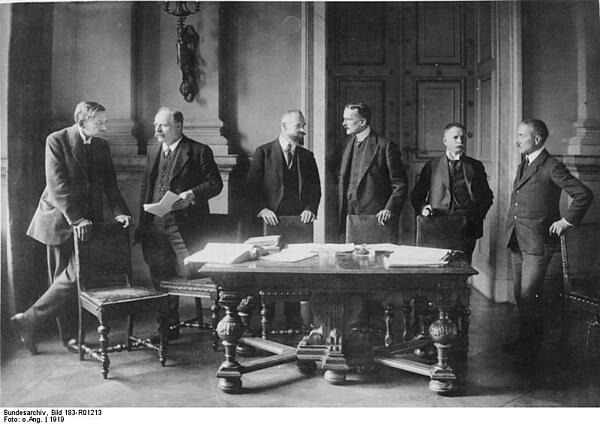Long term causes of World War Two
World War Two had long term causes that reached back to the Treaty of Versailles in 1919. Despite their defeat in World War One, many Germans felt that they had been unfairly treated and that the terms of the Treaty were overly harsh. This perceived humiliation fomented a slow-burning resentment in patriotic Germans, which Adolf Hitler would capitalise on in the 1930s.
The League of Nations also had key design flaws which blunted its impact as a deterrent to would-be aggressors. The League was founded in 1920 with the aim of maintaining world peace. But it had no army to enforce its decisions and its two strongest members, France and Britain, were reluctant to enter into fresh conflicts. Public opinion in both countries was trenchantly pacifist after the terrible human cost of World War One. The League was also not fully representative. Crucially, the American Senate voted against joining in 1919, despite the fact that president Woodrow Wilson had spearheaded the organisation. Had America been a member, it might have provided much needed support to England and France. Finally, the League of Nations was prone to indecision and inaction. To enact a resolution, an unanimous vote of the council (made up of nine, later 15 members) was required; some decisions required a unanimous vote of the whole assembly. This made it possible for members to veto decisions that they disagreed with.
On the whole, however, 1925-9 was a peaceful and prosperous period. Indeed, two new treaties implied that peace would be long-lasting.

European politicians gathered in Switzerland in December 1925 to sign the Locarno Treaties. These terms were agreed upon:
- Belgium, France and Germany would accept the borders decreed by the Treaty of Versailles.
- Germany and Belgium, and Germany and France, would not attack or resort to war against each other again. Italy and Britain were to monitor these agreements.
- Germany and Belgium, and Germany and France, would undertake to settle disagreements by peaceful means, referring conflicts to arbitration tribunals, conciliation commissions or the League of Nations.
- Germany would keep the Rhineland as a demilitarised zone.
- France would protect Poland and Czechoslovakia in the face of future German hostility.
In signing the treaties, the German government infuriated diehard nationalists. To them, the acceptance of several terms of the Versailles treaty was tantamount to treason. But their cries of anger were muted. Weimar Germany's economy had started to recover from the doldrums of 1919 to 1925. Moderate politicians such as Gustav Stresemann gained widespread support; a mark of their progress was their success in persuading the world to let Germany into the League of Nations in 1926.
The Kellogg-Briand Pact of 1928 also gave the world grounds for optimism. Sixty-two signatories, including France, Belgium, the United Kingdom, the United States, Germany, Czechoslovakia and Poland, promised to never use war to resolve disputes with other nations.
But Europe had been lulled into a false sense of security. The Wall street crash of 1929 triggered the Great Depression. Germany was hit hard. Its stable political situation started to splinter and nationalists emerged from the political woodwork to take advantage of the economic turmoil. They rejected the Versailles and Locarno treaties and were ill- inclined to pander to the the League of Nations. By 1932, the Nazi party was the largest party in the Reichstag. Europe's peace had started to look a lot more fragile.
See also: Manchuria 1931
MLA Citation/Reference
"Long term causes of World War Two". HistoryLearning.com. 2026. Web.
